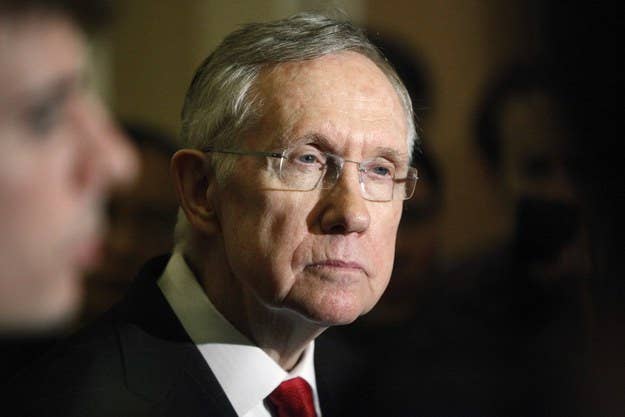
WASHINGTON — Senate Majority Leader Harry Reid on Wednesday backed bipartisan efforts to reexamine the controversial law passed in the wake of the 9/11 terrorist attacks that opened the door to the ever-expanding "war on terror."
Although Reid did not take a specific stand on how the law should be changed, in an interview with BuzzFeed he argued the time has come to revisit the Authorization of Use of Military Force.
"It's easy to be a Monday morning quarterback, but 9/11 was a very difficult time in the history of this country," said Reid, who voted for the law in 2001.
"[But] I definitely think its something we should definitely take a look at. I think 9/11 is a long time ago, and it's something that needs to be looked at again. I have no problem with that," Reid added.
The AUMF gave military and intelligence agencies wide leeway to pursue individuals and organizations with suspected ties to al-Qaeda. The law provided the legal groundwork for the administration's aggressive counterterrorism strategy, from armed drone strikes to "kill/capture" missions, raids similar to the Navy SEAL raid that killed Osama Bin Laden in 2011.
Although anti-war elements in Congress have long complained about the broad scope of the scant 60-word law, over the last several years members on both sides of the aisle increasingly have raised concerns with the law, worried that it can be used for attacks across the globe against people or groups that were never intended by Congress.
"We are still operating in a war declared on Sept. 14, 2001," Democratic Sen. Tim Kaine said Wednesday during a speech at the Center for Strategic and International Studies. "And both the Bush and Obama administrations have determined that that war can be carried out against members of al-Qaeda, against anyone who associates with affiliates or associates of al-Qaeda, no matter when those associates pop up … so long as the al-Qaeda or affiliated organizations have violent intentions against the U.S. or coalition partners. That's sort of a vague phrase."
"I don't think Congress thought passing that AUMF Sept. 14, 2001, that 13 years later we'd be still engaged in war," Kaine added.
Kaine is working with Sen. John McCain to reform the broader War Powers Act to drastically narrow the ability of the White House to essentially declare war on groups or individuals. The bill would include tighter definitions of against whom a president could declare war, requiring greater formal consultation with Congress, and setting strict rules for when a president can take action without congressional authorization.
"If we can't learn from the last 13 years and make some changes, then I say woe on us," Kaine said.
Although Reid's support for reexamining the law could give a boost for efforts to reform the AUMF, it still faces an uncertain future. Groups of lawmakers have been meeting for months on various proposals, and there is still significant disagreement on how to proceed.
Indeed, Kaine himself hinted that a final reform may not come this year, noting, "This is a long term effort … we're kind of building up momentum."

